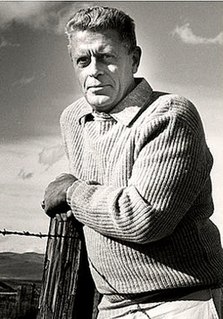A Quote by John Milton
The liberty of conscience, which above all other things ought to be to all men dearest and most precious.
Related Quotes
Liberty is one of the most precious gifts which heaven has bestowed on man; with it we cannot compare the treasures which the earth contains or the sea conceals; for liberty, as for honor, we can and ought to risk our lives; and, on for the other hand, captivity is the greatest evil that can befall man.
The liberty I mean is social freedom. It is that state of things in which liberty is secured by the equality of restraint. A constitution of things in which the liberty of no one man, and no body of men, and no number of men, can find means to trespass on the liberty of any person, or any description of persons, in the society. This kind of liberty is, indeed, but another name for justice.
Liberty lies in the hearts of men and women; when it dies there, no constitution, no law, no court can save it ... The spirit of liberty is the spirit which is not too sure that it is right; the spirit of liberty is the spirit which seeks to understand the minds of other men and women; the spirit of liberty is the spirit which weighs their interests alongside its own without bias.
For, when men shall meet as they ought, each a benefactor, a shower of stars, clothed with thoughts, with deeds, with accomplishments, it should be the festival of nature which all things announce. Of such friendship, love in the sexes is the first symbol, as all other things are symbols of love. Those relations to the best men, which, at one time, we reckoned the romances of youth, become, in the progress of character, the most solid enjoyment.
Is the relinquishment of the trial by jury and the liberty of the press necessary for your liberty? Will the abandonment of your most sacred rights tend to the security of your liberty? Liberty, the greatest of all earlthy blessings - give us that precious jewel, and you may take every things else! . . . Guard with jealous attention the public liberty. Suspect every one who approaches that jewel.
Such regulations may, no doubt, be considered as in some respect a violation of natural liberty. But those exertions of the natural liberty of a few individuals, which might endanger the security of the whole society, are, and ought to be, restrained by the laws of all governments; of the most free, as well as or the most despotical. The obligation of building party walls, in order to prevent the communication of fire, is a violation of natural liberty, exactly of the same kind with the regulations of the banking trade which are here proposed.
True law, the code of justice, the essence of our sensations of right and wrong, is the conscience of society. It has taken thousands of years to develop, and it is the greatest, the most distinguishing quality which has developed with mankind ... If we can touch God at all, where do we touch him save in the conscience? And what is the conscience of any man save his little fragment of the conscience of all men in all time?
We all declare for liberty; but in using the same word we do not all mean the same thing. With some the word liberty may mean for each man to do as he pleases with himself, and the product of his labor; while with others, the same word many mean for some men to do as they please with other men, and the product of other men's labor. Here are two, not only different, but incompatible things, called by the same name - liberty. And it follows that each of the things is, by the respective parties, called by two different and incompatible names - liberty and tyranny.
I am for liberty of conscience in its noblest, broadest, and highest sense. But I cannot give liberty of conscience to the pope and his followers, the papists, so long as they tell me, through all their councils, theologians, and canon laws that their conscience orders them to burn my wife, strangle my children, and cut my throat when they find their opportunity.





































